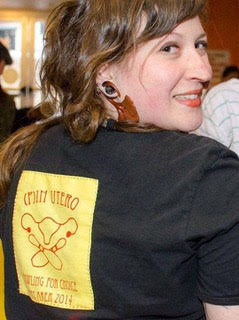Q: How did you start your herbal journey?
A: My herbal journey started with my experience around self resourcing for reproductive health. I was working at a feminist abortion clinic that felt strongly about “keeping women’s health in women’s hands”. I started nerding out about home remedies for yeast infections and bacterial vaginosis, and loved sharing with clients that there might be alternatives to antibiotics or anti-fungals. Home remedies certainly require more attention than a pharmaceutical, but I started witnessing that there was a level of satisfaction and understanding when people shifted to participating in their own wellbeing in that way.
Home remedies might not be accessible or effective for everyone, but so many folks don’t know that this can be an option and I loved being able to share information about alternatives outside of the medical industrial complex.
I also experimented with self induction of an abortion using herbs, and although it wasn’t successful (it rarely is), I felt like I connected with the plants in a new way through that process, and that they showed me important teachings even if they didn’t work in my body in the way that I was expecting. After that I was really hooked on the potential of herbs.
Later, whether as a doula, a student midwife, or an abortion counselor, many of my favorite moments involved helping clients integrate herbs or other home remedies into their self care routines. I felt like herbs could encourage the body to find balance in pregnancy and was also good practice for the labor, birth and postpartum experience.

Q: Where does reproductive health, from abortion to doula work, fit into your herbal practice?
A: I currently self-identify as a community caregiver or companion. Whether I am offering customer service in the store at Five Flavors Herbs, or talking to someone out in the community, my fundamental belief is that the client has the answer and my hope is to offer non-judgemental, compassionate support.
My philosophy has always centered around reproductive justice and autonomy by any means necessary. To me, that means community care first with an emphasis on resilience. Therefore, as a community caregiver having a working knowledge of herbs is fundamental to supporting clients in finding the ways of staying healthy that works for them. Health is not just physical wellbeing, but also alignment in mind, body and spirit. I love offering herbal remedies because herbs are living beings that evolved alongside humans, and evolved to complement all the dimensions of the human experience.
I like working in the retail setting because I get to share information that I have and then the client makes the decision for themselves if that plant or product seems like it will fit into their lifestyle.
Currently, I teach for Cornerstone Birthwork about methods of abortion and abortion companionship/counseling. I feel nervous about the way that abortion is being legislated, and I believe that in the future many people will be called out of their comfort zone to support community members who encounter barriers to accessing abortion. Therefore, it is fundamental that any access point, be it a pharmacy, herb shop, needle exchange, or emergency room, is staffed with people who can support a client facing a reproductive decision. All people deserve to receive accurate medical information about their reproductive options. I am grateful to work in an access point where people come seeking health information.
Q: How do you see herbs supporting people before, during and/or after abortion? Around childbirth?
A: Herbs are good friends, and when I develop a relationship with a particular plant, that plant supports me, no matter what I’m going through. I see herbs supporting people in feeling more grounded when making hard decisions. The decision to get pregnant, or the decision to terminate a pregnancy: these can all be times when individuals call on their plant allies.
Going into a pregnancy with ample reserves and resources is so important, so if people are thinking about getting pregnant I love to show them nourishing herbs and formulas we have in the shop . When I was a student midwife we were taught that a good nourishing tea was a good adjunct to a prenatal vitamin. Some of my favorite herbs are raspberry leaf, nettle leaf, alfalfa leaf, milky oat tops, dang gui root, and astragalus root.
There are lots of herbs that can support the labor and birth process, but I definitely think they should be used with a practitioner present who can monitor factors like blood pressure, bleeding, and other risks.

Q: How can we celebrate the diversity of femme identities during women's history month?
A: Emma Goldman said that “if I can’t dance I don’t want to be part of your revolution”, so finding joy is the first step to any kind of celebration in my book!
I have been deeply influenced by the reproductive justice movement. Reproductive justice is "the human right to maintain personal bodily autonomy, have children, not have children, and parent the children we have in safe and sustainable communities". This seems simple but speaks to many different levels of engagement, both personally and politically.
I think it’s also important that we can celebrate that not all people who self-identify as women were born with a vagina, and not all people who have a vagina self-identify as women.
To be honest, I have always found the idea of “women’s history month” rather awkward. It’s an admission that we live in a culture that still sees “women” as “other” and instead of doing the work to make every month safe for all people, we are designating a month to give lip service to “women’s history”. This doesn’t stop lawmakers from passing legislation that erodes the individual right to bodily integrity and autonomy during the month of March !
Q: How do people with different gender identities experience threats to reproductive rights ?
A: I don’t know that I am the best person to answer this as a cis woman, but when I think of the many identities of the folx I have worked with and companioned through reproductive health, I think that every individual’s story is unique and its hard to make sweeping generalizations.
From a macro-perspective, I think that we need to see the correlation between the loss of the right to abortion with the right to other kinds of bodily autonomy. Its no coincidence that trans bodies are being harshly legislated in the same states that are passing and upholding the most draconian abortion laws.
Any law that aims to legislate reproductive autonomy is a bad law in my book. Also, it’s not just about laws but about access. Clinics can’t always afford to stay open when a law that limits their services or puts their services on hold gets passed. Focusing just on the legislative landscape often silences and erases the voices and stories of the individuals, independent clinics, and grassroots movement.
I think that we need to assume that any person who experiences marginalization or oppression will experience increased barriers and access to healthcare in general. My goal is to see a world where bodies are not legislated, and that everyone has access to the compassionate whole person care we all deserve.
--------------------------

Lucy Yanow comes from a long line of teachers, rabble rousers, yentas and horse thieves and tries to honor that legacy in her daily practice. She is currently a pharmacy technician at Five Flavors Herbs. In the past she has worked as a Full Spectrum Doula, Abortion Counselor, and a health worker at various reproductive health clinics around Northern California. She studied certified professional midwifery at the National Midwifery Institute, and holds a double bachelors in Multicultural and Gender studies and French. When she isn't at Five Flavors herbs putting herbs in different shaped receptacles you can find her facilitating with Cornerstone Full Spectrum intersectional. She is the proud pet guardian to Lemmy the destroyer dog and two cat prisoners.

